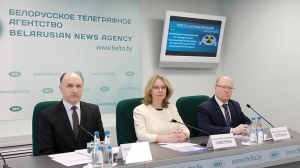Upcoming innovations in Belarusian government's policy on Chernobyl problems sketched out

MINSK, 20 April (BelTA) – First Deputy Head of the Nuclear and Radiation Safety Department of the Belarusian Emergencies Ministry (Gosatomnadzor) Leonid Dedul talked about planned innovations in the government policy on Chernobyl affairs in BelTA's press center.
Leonid Dedul said: “We look at the resolution of Chernobyl problems as a cohesive whole, including by means of improving the legislation. We may consider working out an individual law, which will combine the existing laws on the legal regime in the territories subjected to radioactive pollution as a result of the Chernobyl nuclear power plant catastrophe and on social protection of affected citizens.”
Possible changes will be thoroughly analyzed. A roundtable session involving representatives of Gosatomnadzor and the parliament took place the other day. Participants of the roundtable session discussed what has to be done here and now in order to improve Chernobyl-related legislation. The conversation had been prompted by the institutional changes that happened in late 2022 – early 2023. Back then the Department for Alleviating Consequences of the Catastrophe at the Chernobyl Nuclear Power Plant was dissolved. Its functions were transferred to Gosatomnadzor and a number of other government bodies. The law on the legal regime in the territories subjected to radioactive pollution as a result of the Chernobyl nuclear power plant catastrophe was amended.
Leonid Dedul went on saying: “We've also drafted the national policy in the area of nuclear and radiation safety. It deals with the Chernobyl legacy among other things. The document attracted a lot of interest during the defense of the national report on fulfilling the Convention on Nuclear Safety in Vienna. Experts from other countries wondered when the policy will be approved. The relevant presidential decree has been drafted. It has already been reconciled with interested parties. We expect it will be passed soon.”
Apart from that, a strategy on managing radioactive waste has been approved this year. The document provides for optimizing the facilities for burying decontamination products. One facility will be created for burying radioactive waste. The first stage of the facility is scheduled for commissioning by 2030. “We consider the already polluted territories as a possible location for this facility. Criteria will be worked out. Studies will be performed. Indicators will be compared. We practice a comprehensive approach to the choice of the location,” the official stressed.
Close attention is paid to the Polesie state radiation and ecology reserve as part of the work on Chernobyl-related problems. “It is unique experience for Belarus. The place is one of a kind in the entire world. It can be used for scientific purposes, for studies in the area of nuclear and radiation safety. Meanwhile, measures need to be taken to prevent its impact on the population,” Gosatomnadzor's representative noted.













